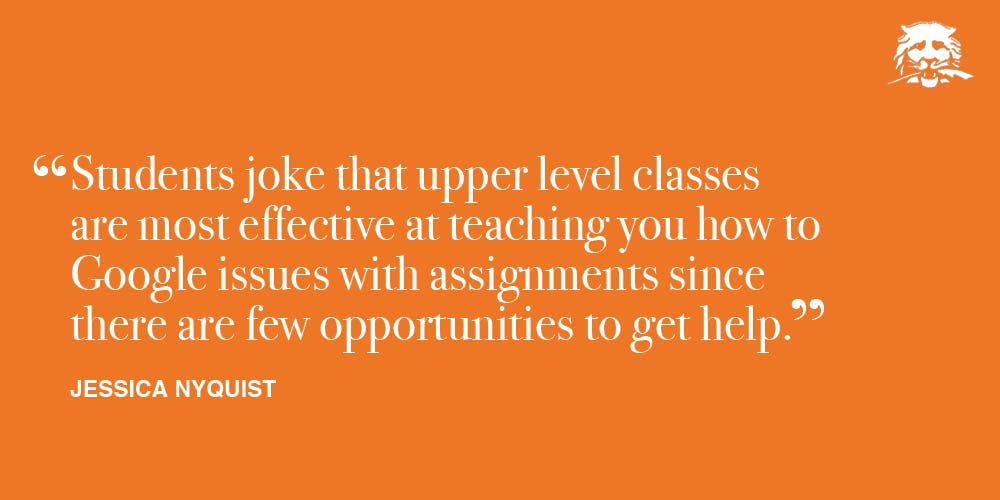For a program that hosts some of the biggest global leaders of the field, the computer science department suffers from profound student dissatisfaction. Students are drawn in by the rewarding challenges of 126 and 226, both well taught and well organized. These introductory courses, both prerequisites for the COS major, are taken by a large portion of undergraduates inside and outside the department, with over 300 students enrolled in COS 126 most semesters. But as students move into upper-level classes, their academic lifestyle is too often defined by frustration.
As a junior in the computer science department, I have a love/hate relationship with the major — a sentiment shared by many of my peers. I come away from most of my courses having learned a lot, having enjoyed lectures and other highlights, and having developed as a programmer, but having lost countless hours of sleep and having phoned home countless times in an anxious frenzy. It’s a major that requires pulling all-nighters — much like many others on campus — but also one where students often feel helpless, unable to get assistance when needed.
This experience was especially prominent in Information Security (COS 432) last semester. The class had over 150 students, four TAs, and no precept. The course reviews on the registrar’s website sum up the experience shared by many students. Most of them start with a variation of “Professor Felten is an amazing lecturer, but...” Students agree that our professor, Edward Felten, was an impressive professor as well as an engaging lecturer, a good representation of the type of faculty in the department. However, students go on to explain that the “course was ridiculously understaffed,” that “TA help is sporadic,” that “your best recourse is usually StackOverflow” (a programming version of Yahoo Answers), and that “not only is the teaching staff unorganized, they seem extremely unmotivated to improve the course.” To sum it up, one reviewer asserted: “This course is an embodiment of what is wrong with Princeton’s COS department. Do better.”
This course was responsible for 90 percent of my Princeton all-nighters to date as students struggled together to finish assignments with few outlets for help. We would regularly reach out to TAs who were unable or unwilling to meet with us. The course undoubtedly fostered comradery, but students echoed a general sense of disappointment, mostly because they expected more from Princeton.
COS is different from many other departments in that the professors are constantly switching the classes they teach, so there is no consistency and little experience guiding a particular course. For the past two-and-a-half years, COS 226, a prerequisite for the major, has changed different lead professors almost every semester. COS 432 has had four different professors in the last six semesters. In contrast, according to Princeton’s course offerings page, Professor Macedo has taught the core WWS 370: Ethics and Public Policy for the last three semesters it has been offered. Professor Centeno has taught SOC 250: Western Ways of War, for the last three semesters it has been offered and will be teaching it next fall. Professor Nunokawa has taught ENG 345: 19th-Century Fiction for the last four semesters it has been offered and is teaching it in the fall as well. Peter Singer’s perennial presence defines his course, Practical Ethics, just like HIS 361 is known to be Professor Zelizer’s class. My experience taking all these courses mentioned was directly impacted by the professor’s connection with the course. It was obvious sitting in lecture that these instructors were discussing their passions and that they had built the course around these interests. In the COS department, in many classes I have felt a disconnect between the professor’s interests and the lectures, assignments, and coursework, especially evident in Information Security.
The COS department has grown unlike any other department at Princeton. According to the registrar’s website, the 2013 graduating class had 72 majors while the 2017 class had 129 — a 75 percent increase. Many other majors have seen increases during this time: ELE has grown from 19 to 33, ORF from 38 to 72, and WWS from 74 to 107. However, these departments have seen fluctuations in numbers while COS has steadily increased in size since 2011.
It feels, from my student perspective, like the department has grown too fast for the infrastructure to keep up. The main complaints I’ve heard are about the disorganization of courses and the lack of access to faculty (TAs, office hours, etc.) because of the large quantities of students enrolled in courses designed for smaller groups. Students joke that upper-level classes are most effective at teaching you how to Google issues with assignments since there are few opportunities to get help. The department has the intellectual manpower, but it needs to improve on consistency in courses across semesters so that professors figure out kinks and can best create a productive learning environment for students.
The problem with COS does not seem to be a lack of faculty interest, expertise, or passion. Nor is it a lack of student engagement, curiosity, or academic commitment. Instead, the department’s courses suffer from a severe lack of organization. This problem is a logistical one. That does not mean that it is easy or straightforward to solve, but it is one that I believe the COS administration can tackle. The administration could address the feeling of helplessness among students by ensuring that if classes grow, an adequate number of TAs are hired to accommodate the new size. Additionally, COS classes that are assignment based would benefit from a precept, even if it is optional, to provide a scheduled outlet for help. Lastly, the department could make an effort to have the same professors teach the same courses across semesters so that organizational problems could be taken care of year to year, preventing new problems from arising in an essentially new course.
We have some of the best faculty in the world. Our professors are on the cutting edge with their research and are leaders in the field. Many, like Professor Felten, have even served the government as leading experts and advisors. We should exit every course feeling excited about the subject and grateful for the challenge, not happy to be alive and eager to sleep for a week.
Jessica Nyquist is a junior in computer science from Houston, Texas. She can be reached at jnyquist@princeton.edu.










